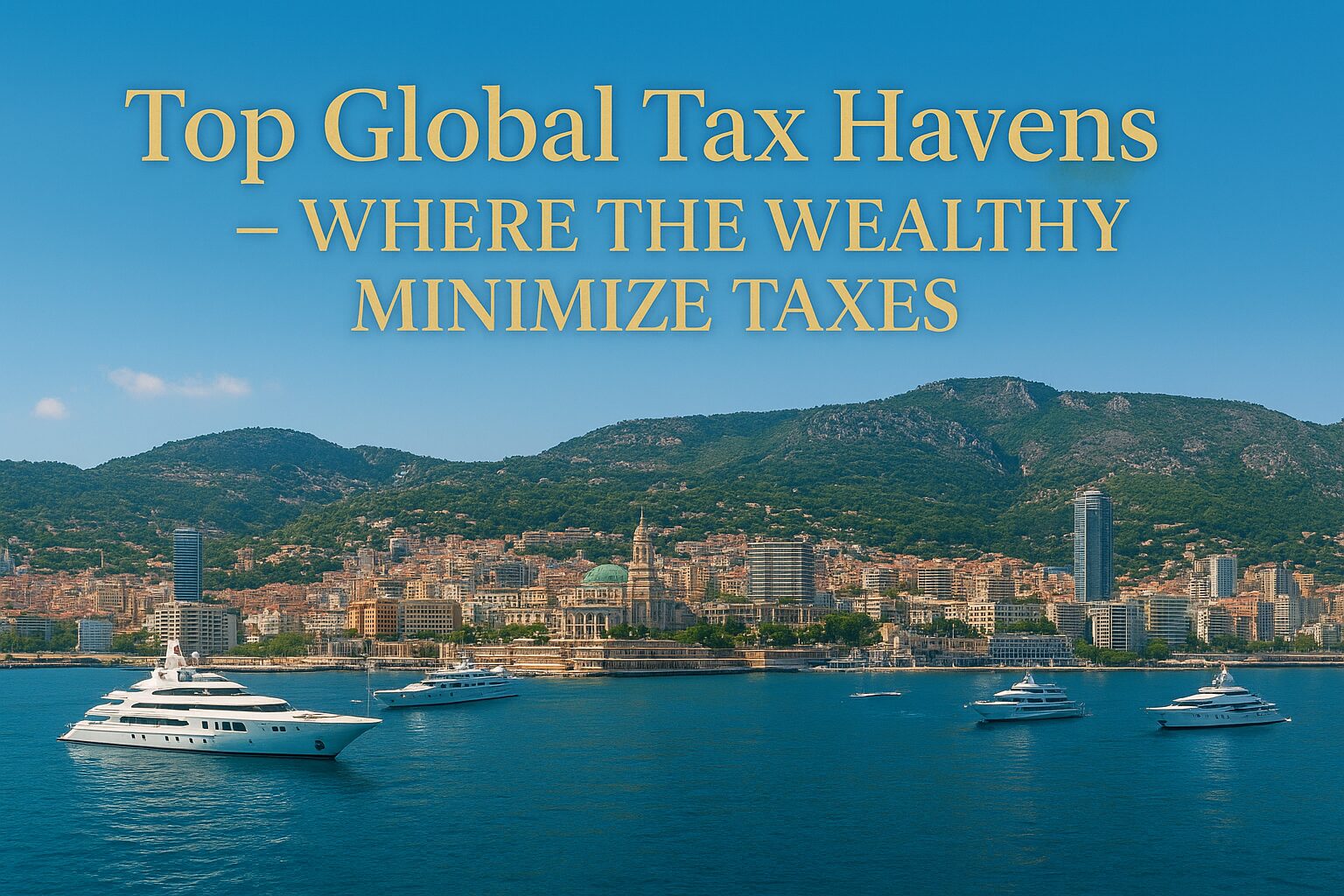Why Global Tax Havens Matter
For high-net-worth individuals and global entrepreneurs, the choice of where to live, invest, or incorporate a business is more than just a lifestyle decision — it’s a financial strategy. A well-structured tax plan can legally minimize burdens, preserve wealth, and provide access to global opportunities.
While “tax haven” often sparks controversy, the reality is that many jurisdictions have intentionally created attractive tax regimes to attract investors, corporations, and talent. By understanding these destinations, wealthy individuals can make informed choices that reduce liabilities while staying fully compliant with international tax laws.
In this guide, we’ll explore the world’s most recognized tax havens, analyze their benefits and drawbacks, and explain how to strategically leverage them without crossing legal boundaries.
1. The Core Characteristics of a Tax Haven
Before diving into specific countries, let’s establish what qualifies as a tax haven:
- Low or Zero Income Tax: Jurisdictions offering personal or corporate tax rates near zero.
- Strong Privacy Protections: Financial secrecy laws that limit disclosure of banking and ownership data.
- Business-Friendly Regulations: Streamlined incorporation processes, minimal reporting requirements, and legal stability.
- International Connectivity: Access to banking systems, capital markets, and favorable trade agreements.
- Residency or Citizenship Options: Pathways for investors, retirees, or entrepreneurs to legally reside and benefit.
Understanding these pillars helps us see why certain regions consistently attract wealthy individuals.
2. Leading Global Tax Havens
Monaco – The Glamorous Zero-Tax Principality
- Personal Taxation: No personal income tax for residents.
- Corporate Tax: Minimal, applied only if more than 25% of turnover is outside Monaco.
- Lifestyle: Luxury living, stable government, safe environment, and global prestige.
- Drawback: Extremely high cost of living and real estate prices.
🇨🇾 Cyprus – The EU-Connected Haven
- Corporate Tax: 12.5% (among the lowest in the EU).
- Double Taxation Treaties: Extensive network with over 65 countries.
- Residency: Non-domicile status allows exemption from taxes on dividends and capital gains.
- Benefit: EU membership provides credibility and access to European markets.
🇦🇪 United Arab Emirates (Dubai, Abu Dhabi)
- Personal Tax: No personal income tax.
- Corporate Tax: Only recently introduced (9%), still among the lowest globally.
- Residency: Golden Visa programs for investors, entrepreneurs, and skilled professionals.
- Attraction: World-class infrastructure, international connectivity, strong banking system.
🇨🇼 Curacao – Caribbean Stability
- Corporate Tax: Offshore entities taxed at ~2%.
- Residency Options: Investor permits and straightforward incorporation processes.
- Specialty: Popular for holding companies and intellectual property structures.
- Drawback: Small domestic economy, reliance on external trade.
🇸🇬 Singapore – Asia’s Financial Powerhouse
- Corporate Tax: 17%, but effective rates are much lower due to incentives.
- Personal Tax: Progressive, capped at 22%.
- Strength: Strong double-taxation treaties, ease of doing business, global financial hub.
- Key Point: Not a traditional zero-tax haven, but offers highly optimized structures for business owners.
🇧🇸 Bahamas – Island Paradise with Zero Taxes
- Personal Tax: No income, capital gains, or inheritance tax.
- Corporate Tax: No corporate tax on international business companies.
- Drawback: Banking secrecy has weakened after global transparency agreements.
- Advantage: Perfect for individuals seeking lifestyle + financial freedom.
🇲🇹 Malta – The Hybrid EU Option
- Corporate Tax: Officially 35%, but effective rate often reduced to ~5% with shareholder refunds.
- Residency: Special programs for investors, retirees, and entrepreneurs.
- Strength: EU credibility, favorable treatment for holding companies.
- Drawback: Complex structures require expert guidance.
🇨🇦 Cayman Islands – Corporate & Fund Haven
- Personal Tax: No income, inheritance, or capital gains taxes.
- Corporate Tax: No corporate tax; major hub for hedge funds and investment vehicles.
- Strength: Highly developed financial services sector.
- Drawback: Increasing global scrutiny from the OECD and FATF.
🇱🇮 Liechtenstein – Europe’s Small but Mighty Haven
- Corporate Tax: Flat 12.5%.
- Trust Structures: Attractive for asset protection and estate planning.
- Strength: Political stability, strong legal frameworks, banking tradition.
- Drawback: Limited lifestyle appeal compared to Monaco or Switzerland.
3. Comparative Analysis: Which Haven Fits Which Strategy?
| Objective | Best Choice | Why |
|---|---|---|
| Luxury Living + Zero Tax | Monaco | Status, safety, prestige |
| EU Market Access | Cyprus / Malta | EU membership, treaties |
| Corporate Expansion | Singapore / UAE | Infrastructure + business incentives |
| Asset Protection | Liechtenstein / Cayman Islands | Trusts, funds, privacy |
| Lifestyle + Simplicity | Bahamas / Curacao | Easy residency, zero tax |
This matrix highlights that no single haven is “best.” The right choice depends on individual goals: wealth preservation, corporate efficiency, or lifestyle.
4. Legal & Strategic Considerations
- Compliance with CRS & FATCA: Modern tax havens must still exchange information under global transparency rules.
- Residency vs. Citizenship: Some havens require actual residence days per year; others offer quick residency through investment.
- Reputation Management: While legal, using tax havens can attract scrutiny from media or regulators. Proper planning is essential.
- Diversification Strategy: Many wealthy individuals use multiple havens — e.g., company in Singapore, residence in Monaco, assets in Cayman.
5. Practical Steps to Leverage Tax Havens
- Define Objectives: Wealth preservation, business expansion, or lifestyle?
- Consult Experts: International tax lawyers and financial advisors are critical.
- Build Structures: Use holding companies, trusts, or funds legally.
- Maintain Substance: Some jurisdictions require local offices, employees, or directors.
- Stay Compliant: Always file required reports in home country to avoid legal risks.
Conclusion: The Future of Global Tax Havens
Despite growing pressure from organizations like the OECD, tax havens are not disappearing. Instead, they are evolving — offering investor residency, citizenship programs, and targeted incentives for high-net-worth individuals.
For those seeking long-term wealth protection, diversifying across multiple jurisdictions while staying compliant with international standards is the ultimate strategy.
